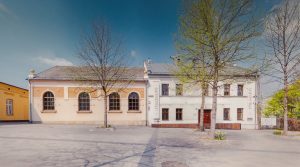The University of Haifa is working on a project to perpetuate Israel’s extraordinarily strong position in chess.
The Grandmaster Chess Research Project, currently in its fundraising phase, will be launched once sufficient funds are available.
Initiated by Aaron Ben-Zeev, the university’s former president, the project is being created in collaboration with Boris Gelfand, an Israeli grandmaster and winner of the 2009 World Cup.
Its objectives are three-fold: to determine the connection between chess and cognitive development; to develop the first Hebrew-language educational software for teaching chess in schools and kindergarten, and to establish an international program for training chess instructors and coaches.
“This initiative is introducing chess and the disciplines in the game’s development into the academic world,” said Michael Yerushalmy, the university’s vice-president and dean of research.
“It will provide an opportunity to achieve breakthrough research and social outreach in a field that has not yet been fully explored. We are well-positioned to examine the impact of chess on students’ math skills, language acquisition and other skills.”
Shay Bushinsky, a chess software developer who’s playing a role in the project, said the skills of chess can advance social knowledge.
“Chess has many advantages in developing social skills, especially in young children,” noted Bushinsky, who teaches computer science courses at Haifa U and Tel Aviv University.
“In general, chess teaches patience, coping with winning and losing and paying respect to an opponent.”
Among the elderly, the relationship between chess and cognitive enhancement is clear, he added.
“It has been empirically shown to preserve critical skills such as memory and calculation. Chess players must cope with time pressure and carry the burden of precise attack and defence planning, which require a robust decision-making process.”
According to Bushinsky, the project is potentially very important for training a new generation of chess instructors and coaches.
Many Israeli chess trainers who acquired their expertise in the former Soviet Union have moved abroad or are no longer employed in the field.
Nonetheless, chess is very popular among Israelis of Russian descent, and Israel has more than 30 grandmasters, a significant achievement for a country of its size and population. As a result, Israel is a superpower in chess, having won numerous medals in international competitions.
But there are troubling signs that Israel’s standing in chess may be on the wane, Bushinsky warned.
Jewish immigrants from the former Soviet Union played an integral role in catapulting Israel to chess prominence. But Israeli grandmasters are getting old and very few new ones are joining the club, he pointed out.
As well, chess is underappreciated by Israeli society and its leadership, he claimed.
Which is why this project may yet make a real difference to chess in Israel.






